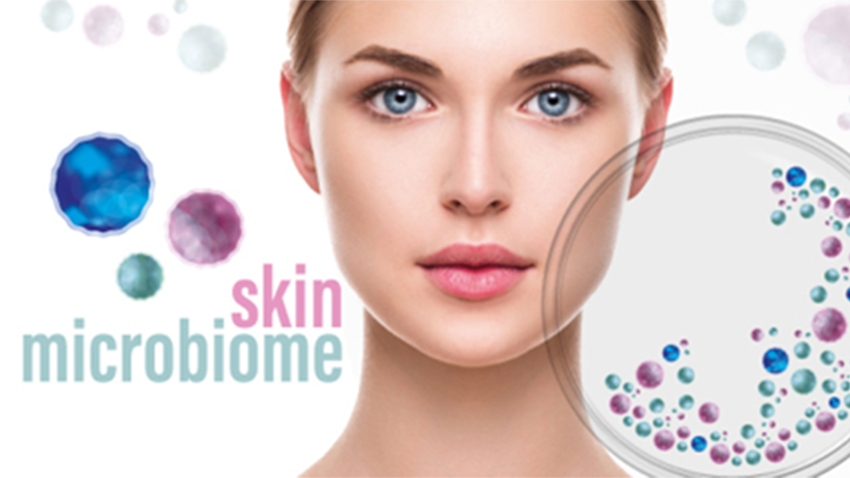The demand for dermatologists is projected to increase substantially. An estimated 72,500 roles are to be filled by 2029, reflecting an annual growth rate of 2.15%. This upsurge underscores a deeper societal acknowledgment of the critical role skin health plays.
Let’s unravel the complex interplay between the trillions of microorganisms that inhabit our skin. Their impact on its health and appearance is significant.
Advancements in understanding the skin’s microbiome are reshaping skincare regimens. These insights are also propelling dermatology into new territories of medical and cosmetic innovation. Dissecting the factors fueling this surge offers valuable insights into dermatology’s prominence.

Understanding the Microbiome
At its core, the microbiome refers to the vast community of microorganisms, including bacteria, fungi, viruses, and mites, that inhabit various environments. When discussing the human body, the microbiome encompasses the trillions of these tiny inhabitants that live on our skin, in our gut, and throughout our body.
Each individual’s microbiome is unique, shaped by genetics, environment, and lifestyle choices. Within the context of the skin, this ecosystem plays a critical role in both health and disease, acting as a first line of defense against external threats and influencing overall skin condition.
The Role of the Skin Microbiome in Maintaining Skin Health
The skin microbiome is pivotal in maintaining the skin’s health and integrity. It accomplishes this through several key mechanisms:
- Protection against pathogens: By occupying space and consuming available resources, beneficial microorganisms help prevent harmful pathogens from establishing a foothold on the skin.
- Immune system modulation: The skin microbiome communicates with the body’s immune cells, educating them to distinguish between harmful invaders and benign presence. This helps in reducing inflammation and preventing skin disorders.
- Maintenance of the skin barrier: Healthy microflora contribute to the strength and resilience of the skin barrier, protecting against environmental damage and reducing water loss, which is crucial for preventing dryness and irritation.
Factors Influencing the Skin Microbiome
Several factors can dramatically alter the composition and health of the skin microbiome, including:
- Hygiene practices: Over-washing or using harsh soaps can disrupt the skin’s microbiome, stripping away beneficial organisms and damaging the skin barrier.
- Antibiotics and medications: Certain medications, especially broad-spectrum antibiotics, can decimate microbial communities on the skin, leading to imbalances.
- Diet: What we eat can influence our skin’s microbiome from the inside out. Diets rich in fiber, for example, can promote a healthy diversity of gut microbes, which in turn can positively affect the skin.
- Environment: Exposure to diverse environments can enrich the skin microbiome, while living in highly sanitized environments may limit microbial diversity.
- Age and hormones: Changes in hormone levels, particularly during puberty, pregnancy, and menopause, can affect the skin’s microbial composition. Similarly, as we age, the diversity and balance of the skin microbiome can shift.
Understanding these factors and how they interact with the microbiome is crucial for anyone looking to enhance their skin health through targeted skincare regimes or lifestyle adjustments.
By fostering a balanced and diverse skin microbiome, individuals can not only improve their skin’s appearance but also bolster its natural defenses, paving the way for both beauty and health benefits.

The Interplay Between Microbiome and Skin Health
The interplay between the microbiome and skin health is a fascinating and complex subject, involving a delicate balance of microorganisms that reside on the skin’s surface. The skin microbiome consists of bacteria, fungi, viruses, and mites that coexist in harmony. It plays a crucial role in protecting the skin against pathogens, influencing immune responses, and maintaining the skin’s overall health and appearance. Here’s a detailed exploration of how the microbiome affects skin health:
How the Microbiome Affects Skin Barrier Function
The skin barrier is the outermost layer of the skin, known as the stratum corneum, along with the underlying layers that work together to protect against environmental aggressors, prevent water loss, and maintain skin integrity. The microbiome contributes to the skin barrier function in several ways:
- Protection Against Pathogens: Beneficial microorganisms on the skin can outcompete harmful pathogens for resources and space, preventing them from establishing infections. Some microbes also produce substances that directly inhibit pathogen growth.
- Regulation of Skin pH: The skin microbiome helps maintain a slightly acidic pH on the skin’s surface, which is crucial for barrier integrity and inhibits the growth of harmful bacteria.
- Immune Modulation: Microbial interactions with skin cells help regulate immune responses, ensuring that the skin can effectively defend itself against pathogens without launching excessive reactions that could damage the skin barrier.
Impact of Microbiome on Skin Conditions
The balance and composition of the skin microbiome can significantly affect various skin conditions:
- Acne: Acne is associated with an overgrowth of Propionibacterium acnes (now known as Cutibacterium acnes), a bacterium that normally resides on the skin. Imbalances in microbial communities can lead to inflammation and acne development. Research suggests that promoting a healthy microbiome may reduce acne severity.
- Eczema (Atopic Dermatitis): Eczema is linked to a reduction in microbial diversity and an increase in Staphylococcus aureus on the skin, which can exacerbate skin inflammation and damage the skin barrier. Enhancing microbial diversity and reducing harmful bacterial populations are potential strategies for managing eczema.
- Aging: Aging skin shows changes in microbial diversity, including increased populations of certain bacteria associated with skin dryness and a decrease in beneficial microbes that support skin moisture and elasticity. Maintaining a balanced microbiome may help mitigate some signs of skin aging.
Importance of Microbial Diversity for Skin Health
Microbial diversity refers to the variety of different microorganisms present in the microbiome. Higher microbial diversity on the skin is generally associated with better skin health for several reasons:
- Resilience: A diverse microbiome is more resilient against disruptions, whether from external factors like antibiotics or internal changes such as hormonal fluctuations. This resilience helps the skin recover more quickly from disturbances.
- Prevention of Dominance by Harmful Microbes: A diverse ecosystem prevents any single microorganism from becoming too dominant, reducing the risk of infections and inflammation associated with overgrowths of specific harmful microbes.
- Support of Skin Functions: Different microbes contribute to various skin functions, such as moisture retention, protection against UV radiation, and wound healing. A diverse microbiome ensures that all these functions are supported.

Harnessing the Power of Microbiome for Beauty Enhancement
Here’s an in-depth look into how the incorporation of probiotics, prebiotics, and microbiome-friendly products into skincare routines can transform skin health and beauty.
Probiotics and Prebiotics in Skincare Products
- Probiotics: These are live microorganisms, which, when applied to the skin, can confer numerous benefits. Probiotics in skincare typically involve formulations containing beneficial bacteria or yeast that can help balance the skin’s microbiome. They can reduce inflammation, enhance the skin’s barrier function, and inhibit the growth of harmful pathogens. By restoring balance, probiotics can help address a range of skin concerns, including acne, eczema, and rosacea.
- Prebiotics: Prebiotics are nutrients that feed the beneficial bacteria already present on the skin, helping them to flourish and outcompete harmful microorganisms. Ingredients like oligosaccharides, polysaccharides, and certain plant fibers act as prebiotics in skincare formulations. They help maintain a healthy skin barrier and improve skin hydration, contributing to a smoother, more radiant complexion.
The Rise of Microbiome-Friendly Skincare Routines
The growing awareness of the skin microbiome’s role in skin health has led to the popularity of microbiome-friendly skincare routines. These routines emphasize gentle cleansing, hydration, and the use of products designed to support the skin’s natural flora instead of disrupting it. Key aspects include:
- Gentle Cleansing: Avoiding harsh soaps and scrubs that strip away natural oils and beneficial microbes, thereby using gentle, pH-balanced cleansers that preserve the skin’s acid mantle.
- Barrier Support: Using products that reinforce the skin’s barrier function, often enriched with lipids, ceramides, and fatty acids similar to those found in healthy skin.
- Selective Use of Actives: Choosing active ingredients that target specific concerns without compromising the microbiome’s balance, such as niacinamide for inflammation and hyaluronic acid for hydration.
Clinical Evidence Supporting the Efficacy of Microbiome-Based Beauty Products
The effectiveness of microbiome-based beauty products is increasingly supported by scientific research. Studies have shown:
- Improvement in Skin Conditions: Clinical trials have found that probiotic and prebiotic-containing products can significantly improve conditions like acne, eczema, and rosacea by reducing inflammation, enhancing skin barrier function, and modulating the skin’s immune response.
- Enhancement in Skin Appearance: Research indicates that microbiome-friendly products can improve skin hydration, elasticity, and appearance. For example, a study might show that participants using a probiotic moisturizer reported enhanced skin radiance and reduced signs of aging compared to a control group.
- Resilience Against Environmental Stressors: Some studies suggest that probiotic skincare products can boost the skin’s resilience against pollution and UV radiation, potentially preventing premature aging and pigmentation.
Given the mounting clinical evidence, it’s clear that microbiome-based beauty products not only support skin health but also offer a promising avenue for beauty enhancement. By focusing on the health of the skin’s microbiome, these products work holistically to reveal a naturally radiant, healthy complexion.

Practical Tips for Incorporating Microbiome-Friendly Practices into Beauty Regimens
Here are 10 practical tips to help you get started:
- Switch to Gentle Cleansers: Opt for mild, pH-balanced cleansers that effectively clean without stripping the skin of its natural oils and beneficial microbes.
- Incorporate Probiotic Skincare Products: Look for skincare products containing live probiotics or probiotic-derived ingredients to balance and nourish your skin’s microbiome.
- Add Prebiotics to Your Routine: Use skincare products with prebiotic ingredients to feed and strengthen your skin’s beneficial bacteria, promoting a healthy and balanced skin ecosystem.
- Minimize Over-Exfoliation: Limit the use of harsh physical scrubs and chemical exfoliants that can disrupt the skin’s microbiome and barrier function.
- Stay Hydrated: Moisturize regularly with products that contain ingredients like hyaluronic acid, which not only hydrate but also support the skin’s natural flora.
- Protect the Skin Barrier: Use products enriched with ceramides, fatty acids, and cholesterol to repair and maintain the integrity of the skin barrier, enhancing the microbiome’s health.
- Consider Your Diet: Consume a balanced diet rich in prebiotic and probiotic foods to support your skin’s microbiome from the inside out. Foods like yogurt, kefir, miso, and high-fiber fruits and vegetables are great choices.
- Limit Antibacterial Products: Avoid overuse of antibacterial washes and hand sanitizers that can kill off beneficial bacteria on the skin, unless medically advised.
- Reduce Stress: High stress levels can imbalance your skin’s microbiome. Incorporate stress-reduction techniques such as meditation, yoga, or regular exercise into your lifestyle.
- Wear Sunscreen Daily: Ultraviolet (UV) exposure can damage the skin and alter its microbiome. Use a broad-spectrum sunscreen every day to protect your skin and its microbial inhabitants.
By adopting these microbiome-friendly practices, you can create a more effective and holistic beauty regimen that supports your skin’s natural defenses, leading to healthier, more resilient, and radiant skin.

Challenges and Future Directions
The exploration of the skin microbiome as a frontier for beauty enhancement presents both exciting possibilities and complex challenges. Delving into the current limitations, ethical considerations, and potential future developments offers a comprehensive outlook on where this field might head next.
Current Limitations in Microbiome Research for Skincare
- Complexity of the Skin Microbiome: The skin hosts a diverse array of microorganisms, and their interactions with each other and the human body are complex. Understanding the specific contributions of different microbes to skin health and disease is a significant challenge.
- Individual Variability: There’s considerable variation in the skin microbiome between individuals due to factors like genetics, environment, lifestyle, and skin type. This variability makes it difficult to develop one-size-fits-all solutions.
- Lack of Standardization: There’s a need for standardization in research methodologies and product formulation to ensure that findings are comparable and reproducible across studies.
- Regulatory Hurdles: The classification and regulation of probiotic and prebiotic skincare products remain murky. Ensuring these products meet safety and efficacy standards without stifling innovation is a balancing act.
Ethical Considerations in Microbiome-Based Beauty Enhancement
- Biodiversity Preservation: With the increasing interest in sourcing novel microbes for beauty products, there’s a risk of disrupting natural ecosystems. Ethical sourcing practices must be devised and adhered to.
- Access and Equity: Advanced microbiome-based treatments might be expensive, raising concerns about access and equity. Ensuring these innovations benefit a broad spectrum of the population.
- Privacy Concerns: Research involving the human microbiome often requires personal data, which raises privacy issues. Ensuring the confidentiality and ethical use of such data is paramount.
- Consumer Education: There’s a risk of misinformation or unrealistic expectations about the benefits of microbiome-focused products. Ethical marketing and transparent communication are essential to educate consumers properly.
Potential Future Developments in Microbiome-Focused Beauty Products and Practices
- Personalized Skincare: Advances in genomics and microbiome analysis could lead to personalized skincare solutions that are tailored to an individual’s unique microbial composition, addressing specific skin concerns more effectively.
- Bioengineered Microbes: Research into genetically modified microorganisms could yield strains designed to deliver specific benefits, such as enhanced hydration or targeted treatment of skin conditions.
- Protective Living Biofilms: Innovations may include the development of living protective biofilms that can be applied to the skin as a second ‘smart skin’, offering dynamic protection against environmental damage, pathogens, and aging.
- Integration with Wearable Technology: Future developments could see the integration of microbiome analysis with wearable technology, providing real-time insights into the skin’s condition and microbiome health, thus allowing for dynamic adjustments in skincare routines.
- Eco-Friendly and Sustainable Formulations: The industry might move towards more eco-friendly formulations and packaging, focusing on minimizing environmental impact while supporting skin microbiome health.

Conclusion
In conclusion, the microbiome plays a vital role in skin health and beauty. It protects against harmful bacteria, affects the immune system, and maintains the skin’s protective barrier. Understanding and taking care of our skin microbiome is essential for effective skincare.
For personal advice and expert knowledge on anti-aging techniques that are tailored to your specific microbiome, schedule a consultation with Doctor Roya, a leading expert in the field. Her expertise and dedication to advancing skincare science can help you make the most of your skin’s microbiome to achieve radiant and youthful skin.
Stay connected with Doctor Roya Hassad on social media to stay updated on the latest research, tips, and breakthroughs in microbiome studies. By staying informed and actively participating in the ever-evolving field of skincare, you can start a journey towards healthier and more vibrant skin.




